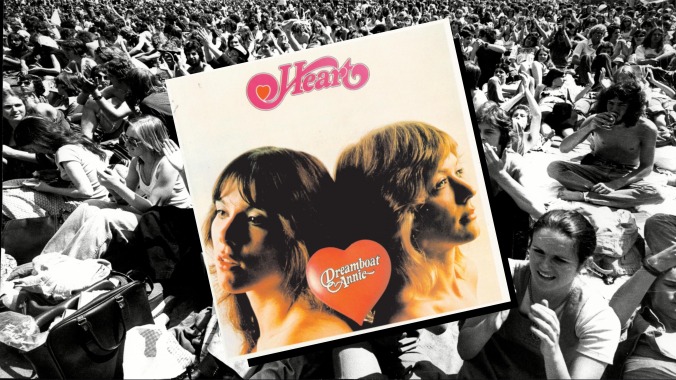Time Capsule: Heart, Dreamboat Annie
Subscriber Exclusive

Every Saturday, Paste will be revisiting albums that came out before the magazine was founded in July 2002 and assessing its current cultural relevance. This week, we’re looking at the Wilson sisters’ blood-pumping debut, which showed how rock music could be tough and gentle, all while embracing an admiration for both the hard and soft rock palettes that were dominating the zeitgeist in the mid-to-late 1970s.
The title of “female Led Zeppelin” for Heart is a major disservice to the talents and sheer power of the Wilson sisters—and I say this as a Zeppelin fan. I grew up hearing “Crazy On You” play on the radio with my mom, and we both applauded Ann Wilson’s dominant vocal ability and Nancy Wilson’s trailblazing guitar work for future female rock stars. Dreamboat Annie’s cover spotlights the two forces of sibling nature standing back to back, seemingly naked, donning hairstyles I’ve been desperately trying to emulate for years. It’s a picture that’s burned into my brain, and I remember rediscovering Dreamboat Annie when I started trying to learn guitar in middle school. I would scream alongside Ann, trying to mimic the impressive guitar work of Nancy—to little avail. The record has remained a staple in my collection ever since.
Dreamboat Annie is a blood-pumping debut record that showed how rock music could be tough and gentle, all while holding an admiration for both the hard and soft rock tones that were dominating the zeitgeist in the mid-to-late 1970s—with its harsh dividing line amongst other artists being shattered by the Wilson sisters. The Seattle-based band took off to Vancouver to record their debut, initially only releasing it in Canada. Soon after the success of “Magic Man” in the North—hitting #26 on the RPM “Top Singles” chart—their small-time label Mushroom Records expanded to the US solely to capitalize on Heart’s burgeoning success. Though the relationship between Mushroom and Heart was short-lived following tense royalty negotiations and a distasteful ad in Rolling Stone, Heart’s successes were just kicking off.
The mid-‘70s was the perfect era for Heart to begin making assertive and dynamic rock ‘n’ roll alongside their badass contemporaries like Debbie Harry, Joan Jett, Suzi Quatro and Stevie Nicks—all of whom were following in the footsteps of early rock pioneers like Janis Joplin, Grace Slick, the Ronettes and, of course, the incomparable Sister Rosetta Tharpe. It was becoming more common for rock to be fronted by women then, but even still, the in-your-face nature of Heart’s sound was unique for a time when soft rock leaned toward the dominating, folky stylings of singer-songwriters like Joni Mitchell and Linda Ronstadt. Though all these artists were disruptive in their own right, Heart decided that being loud wasn’t just for dudes on Dreamboat Annie, and that’s not to say that Dreamboat Annie is all hard rock. No, it is the perfect blend of both sides of the rock scene of the 1970s, where bands typically remained in one lane. Similar to how the two sisters’ talents complemented each other flawlessly, these two sides of their musical personality crafted a debut full of surprises.
The first time I heard “Magic Man” was in Sofia Coppola’s The Virgin Suicides as Trip Fontaine struts on the screen to that searing opening riff in his brown leather jacket with his mushroom-shaped hair. “Try to understand / He’s a magic man,” Ann pleads over a nasty groove from the rhythm section and, staring at Josh Hartnett, I more than understood. This track is one of Heart’s biggest hits for a reason: All the pieces of Heart thrive together, from Ann’s attitude-laden wail to Nancy’s groovy guitar backing to Howard Leese’s funky keyboard synth to Roger Fisher’s slick guitar solo, making for five-and-a-half minutes of pure rock bliss.
-

-

-

-

-

-

-

-

-

-

-

-

-

-

-

-

-

-

-

-

-

-

-

-

-

-

-

-

-

-

-

-

-

-

-

-

-

-

-

-








































